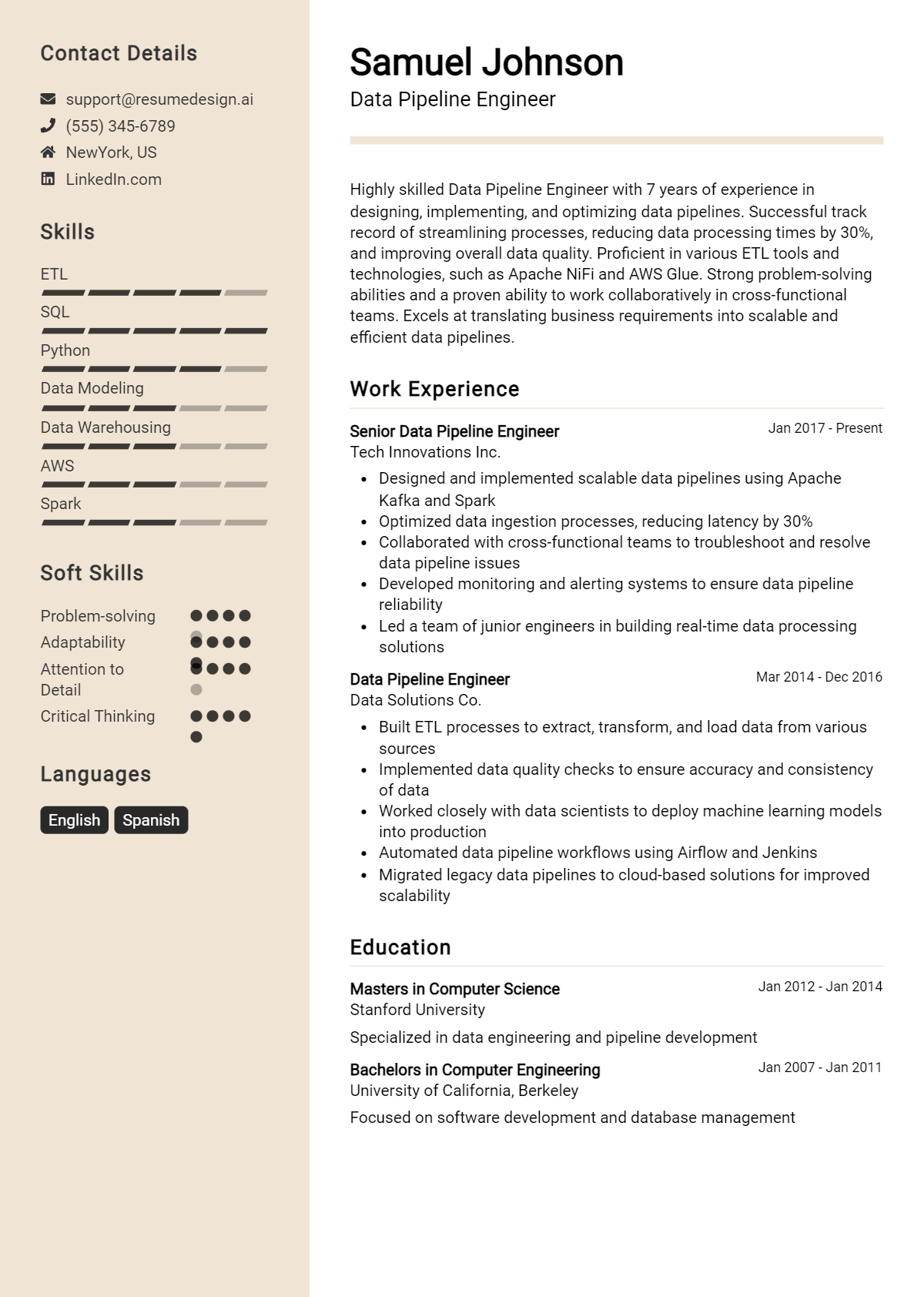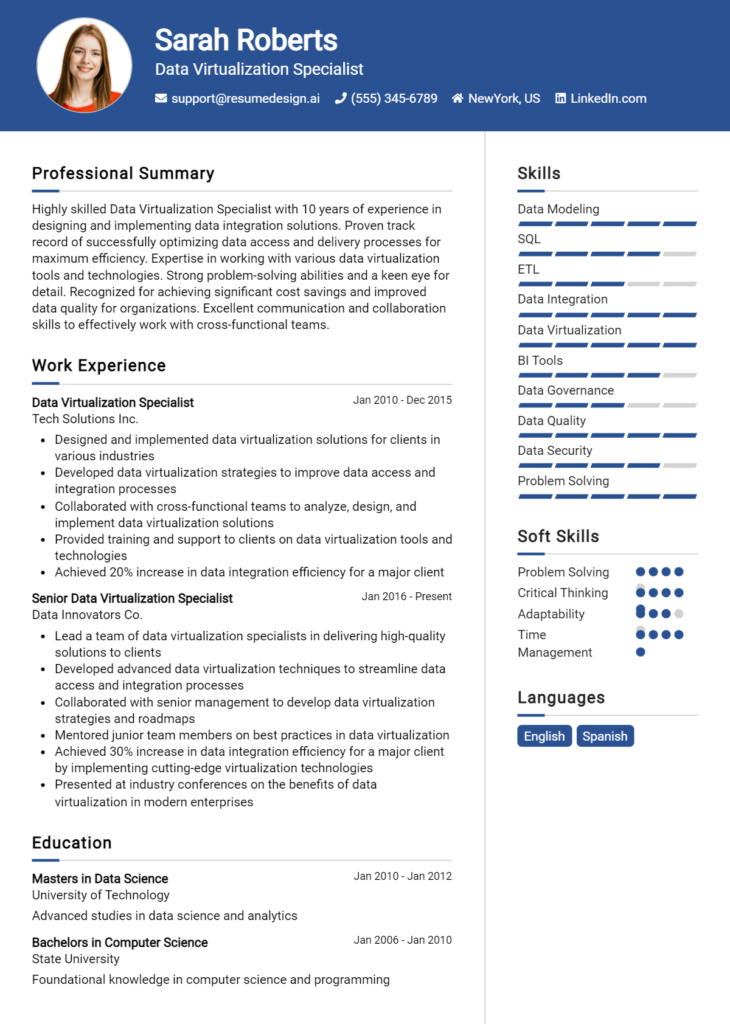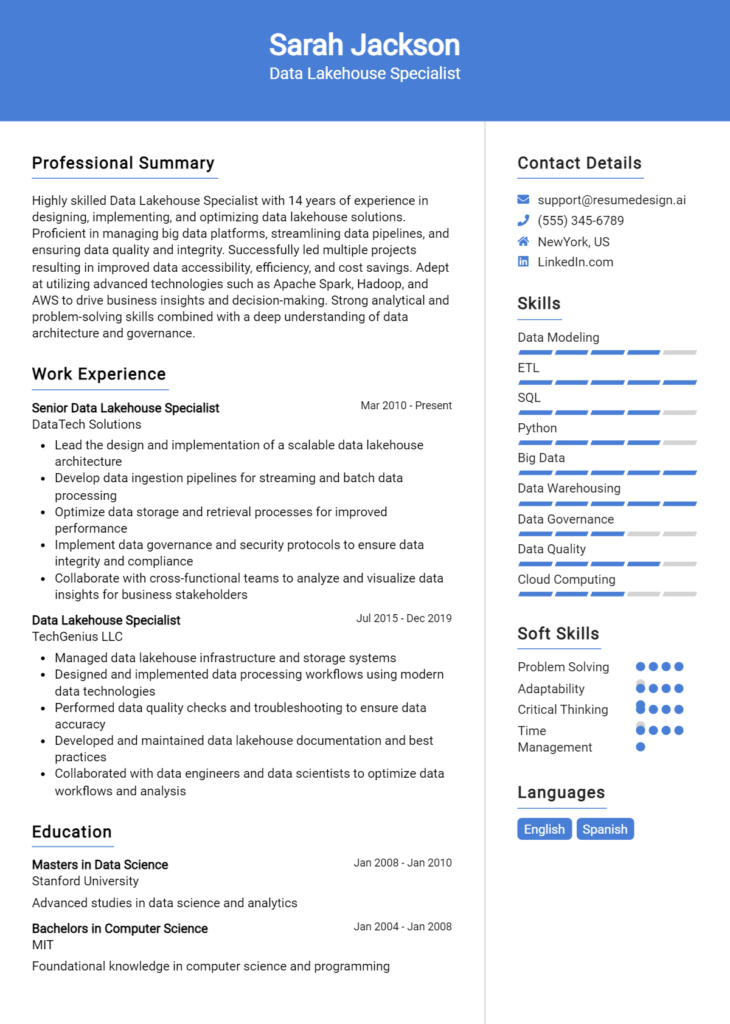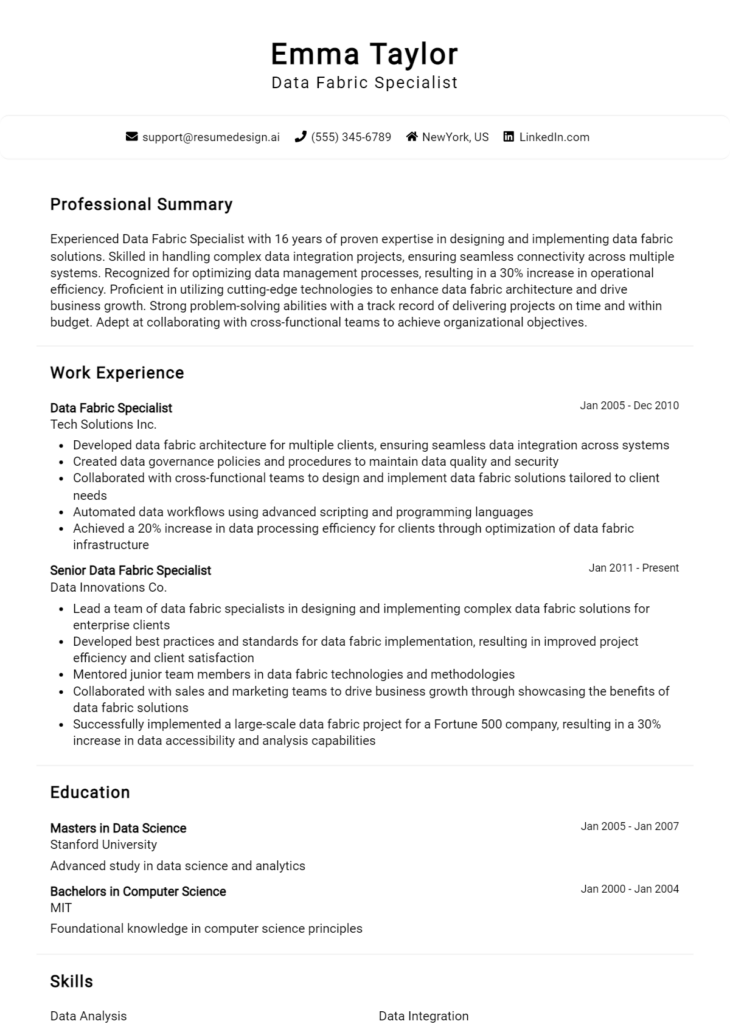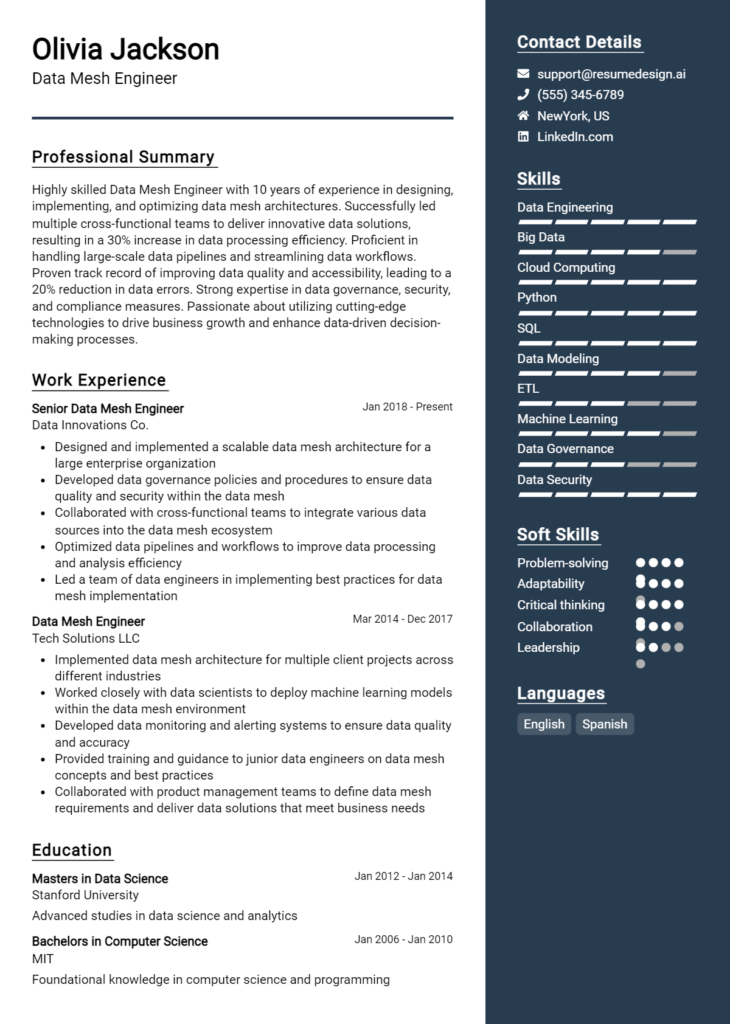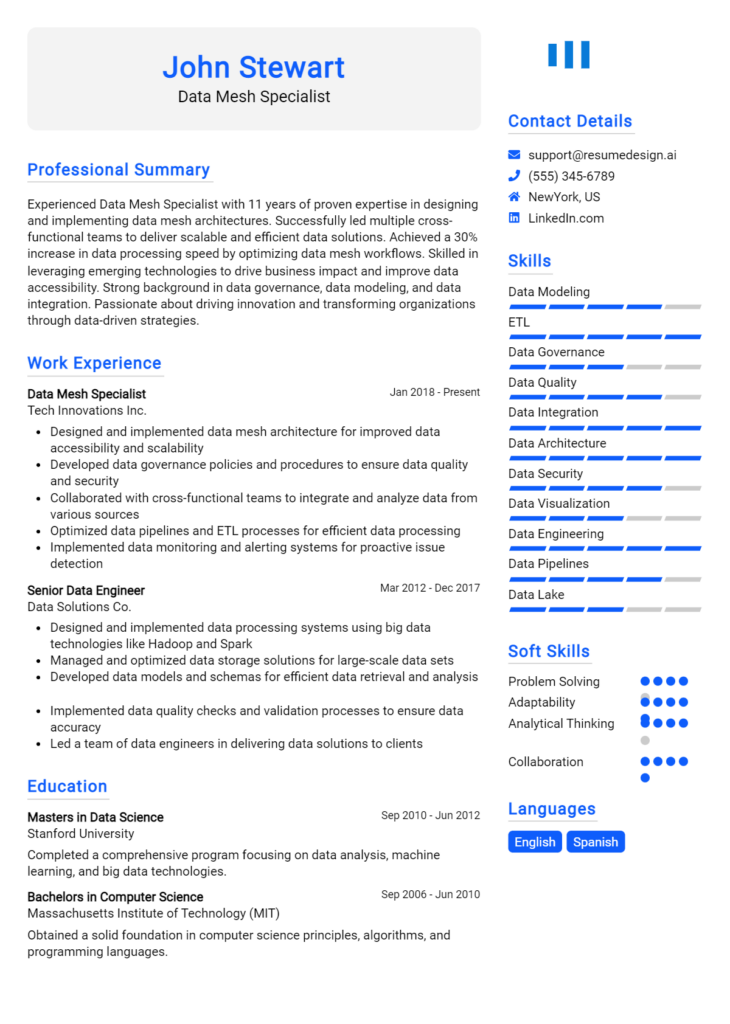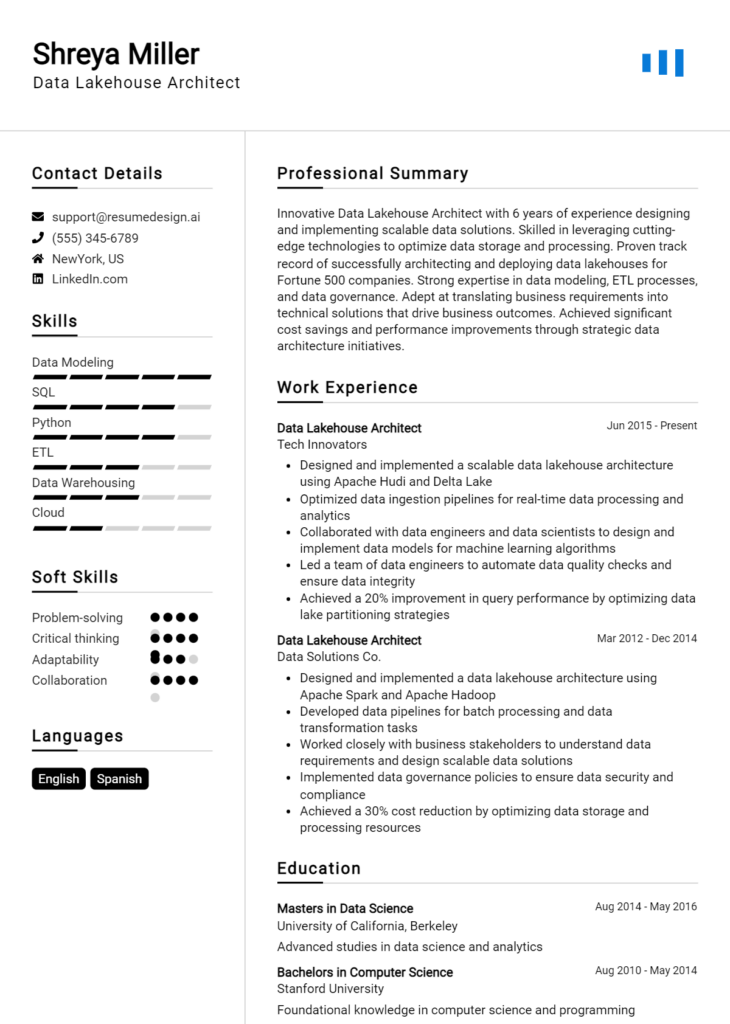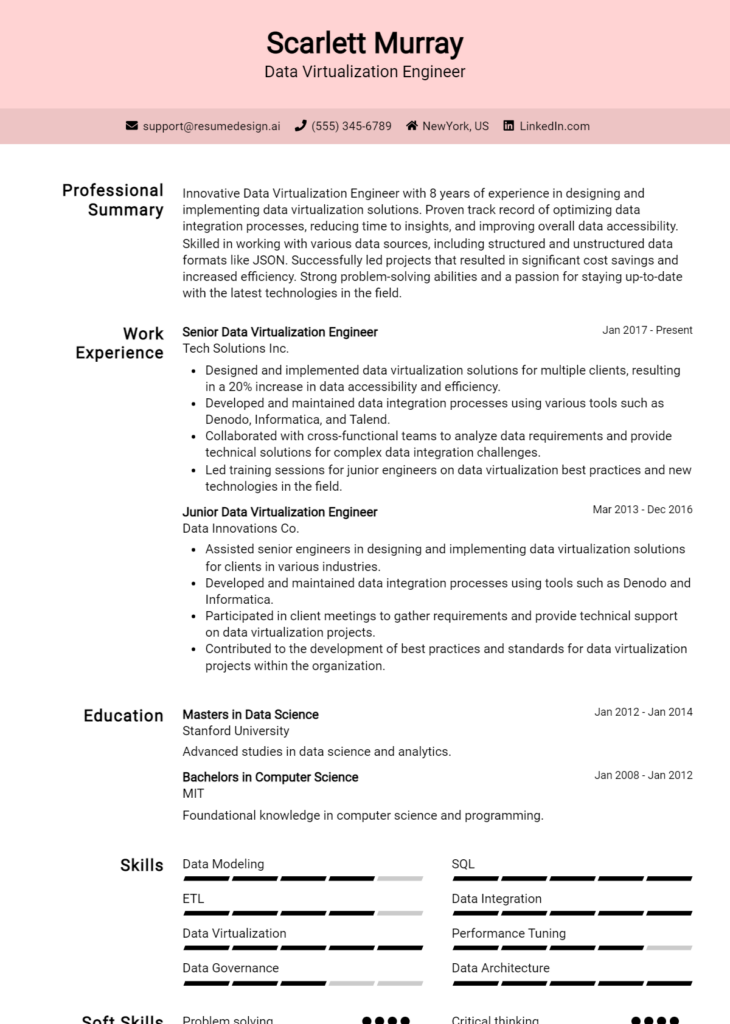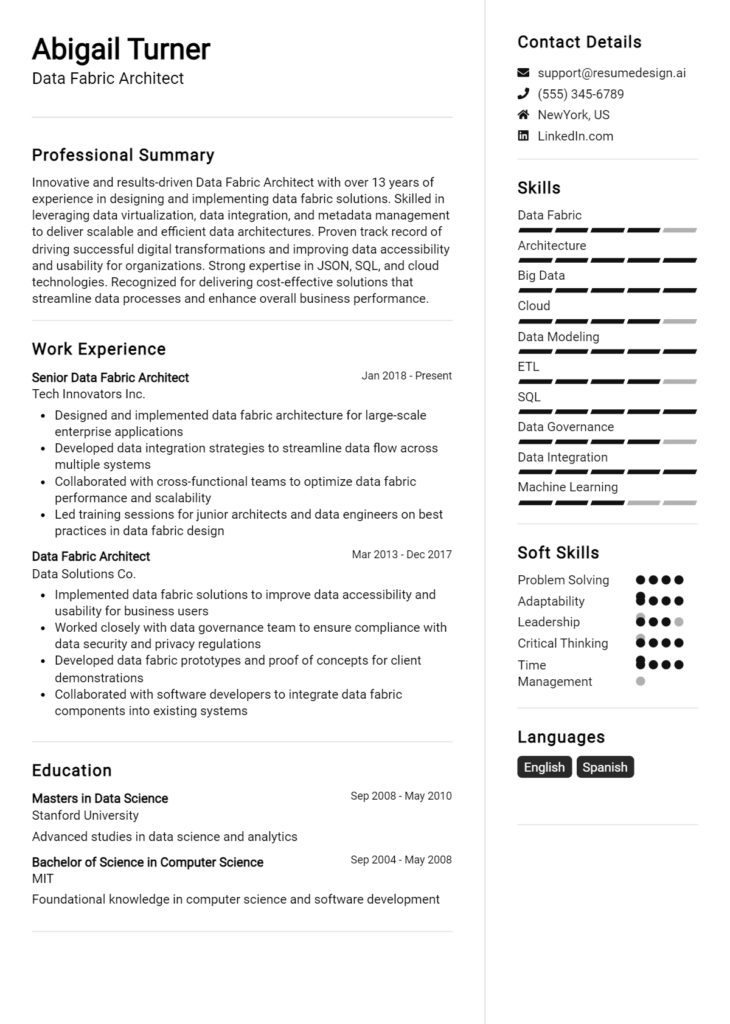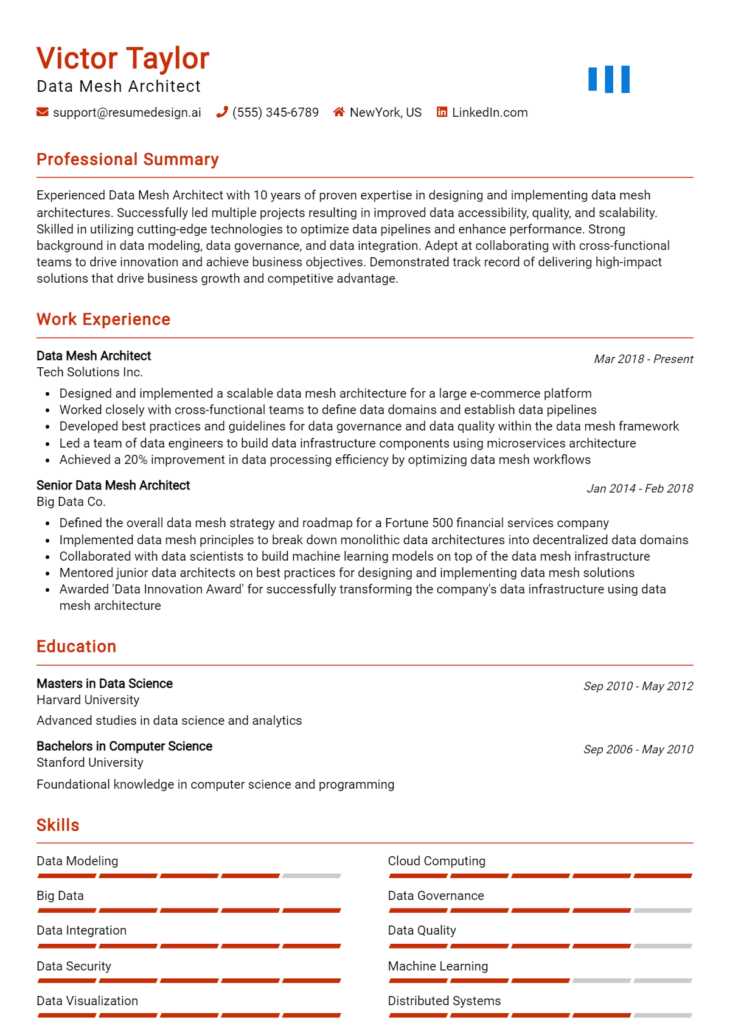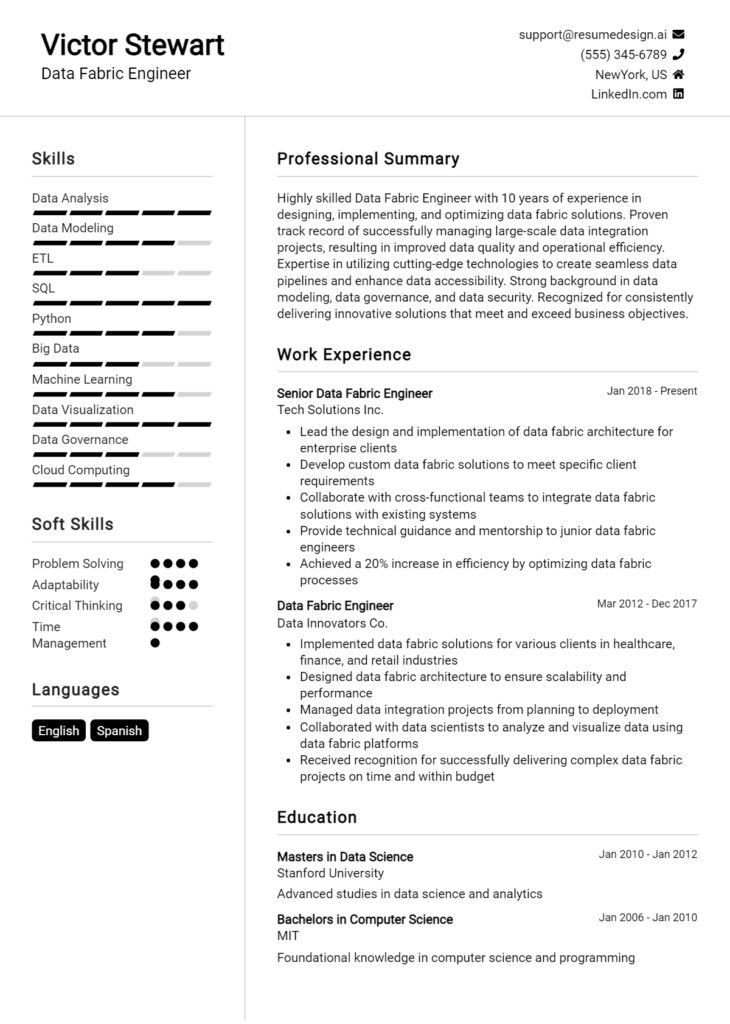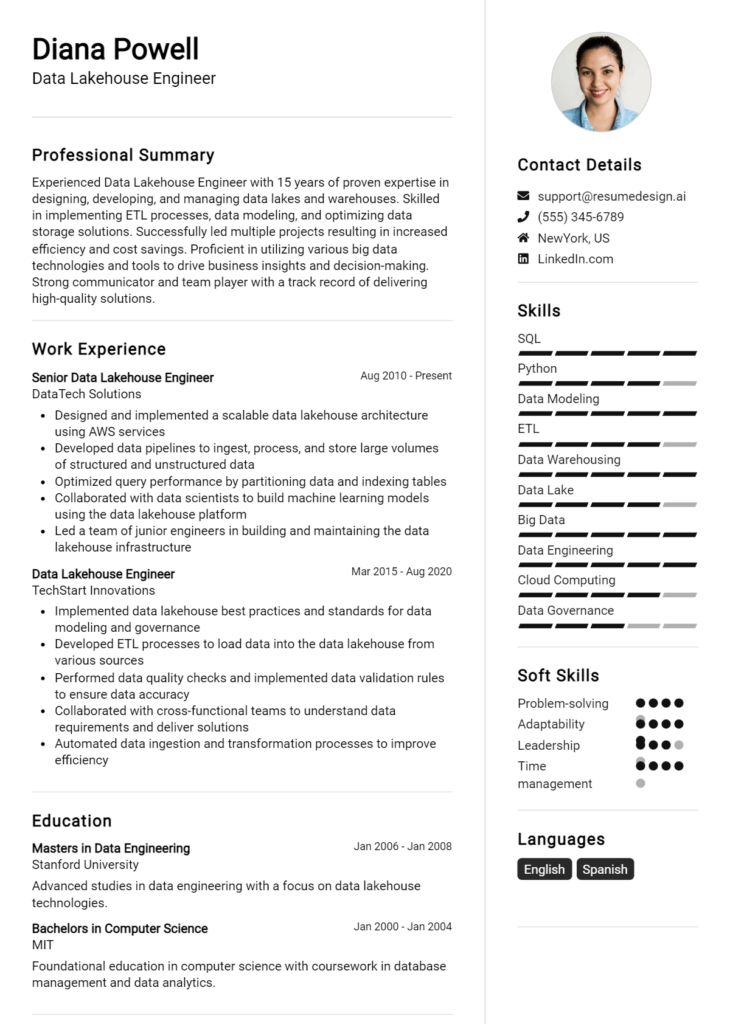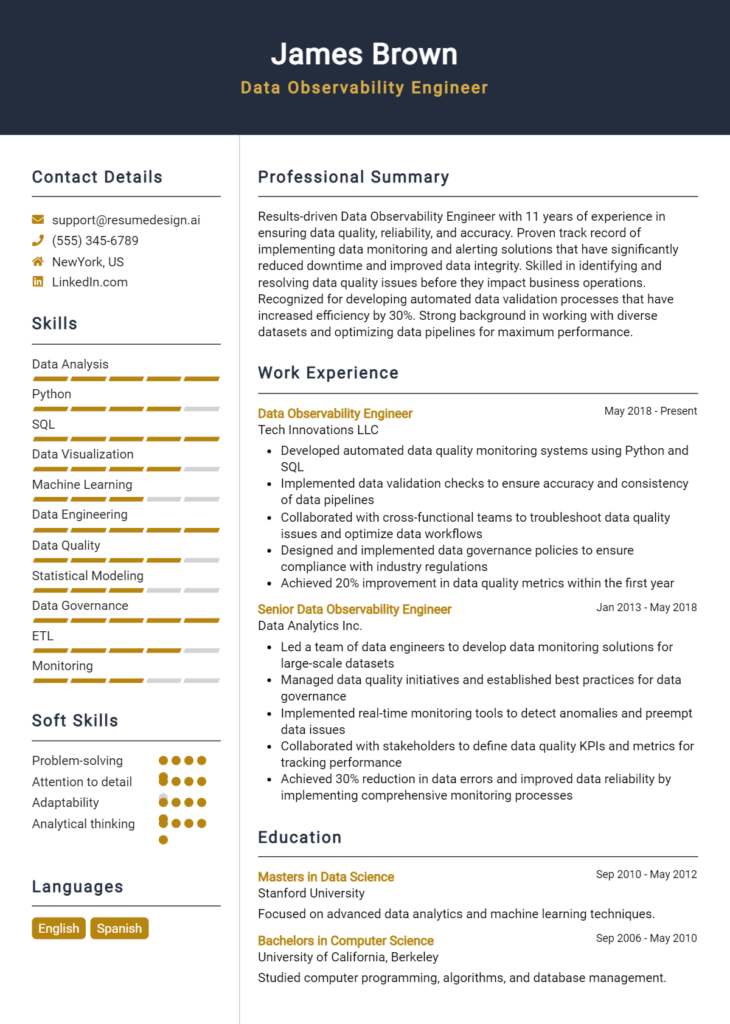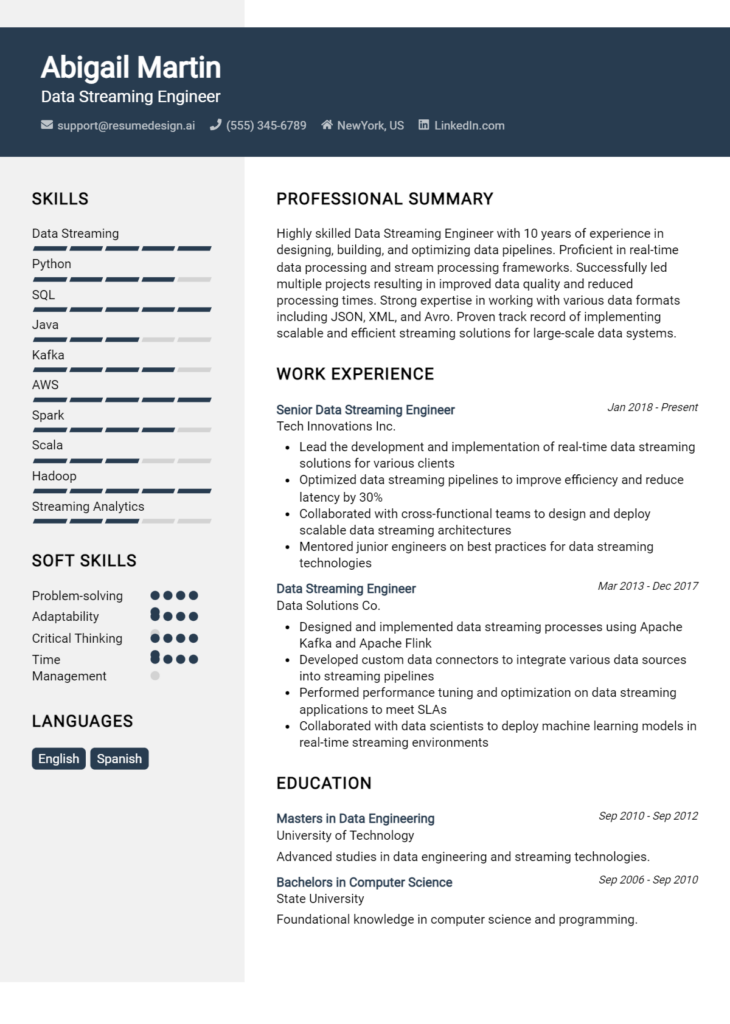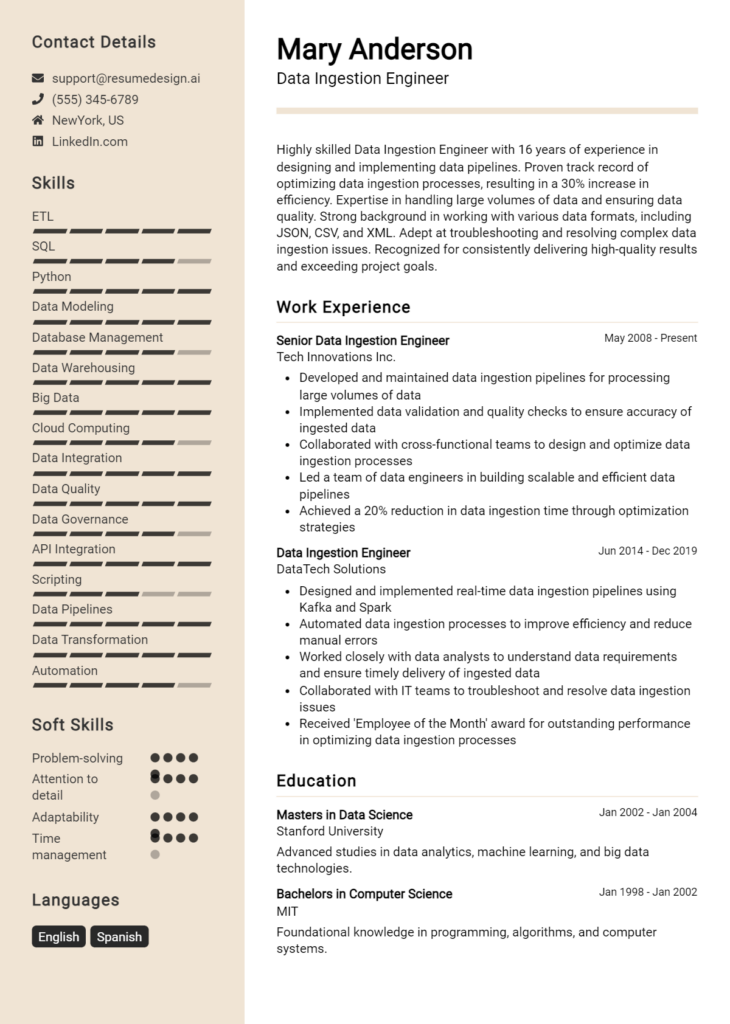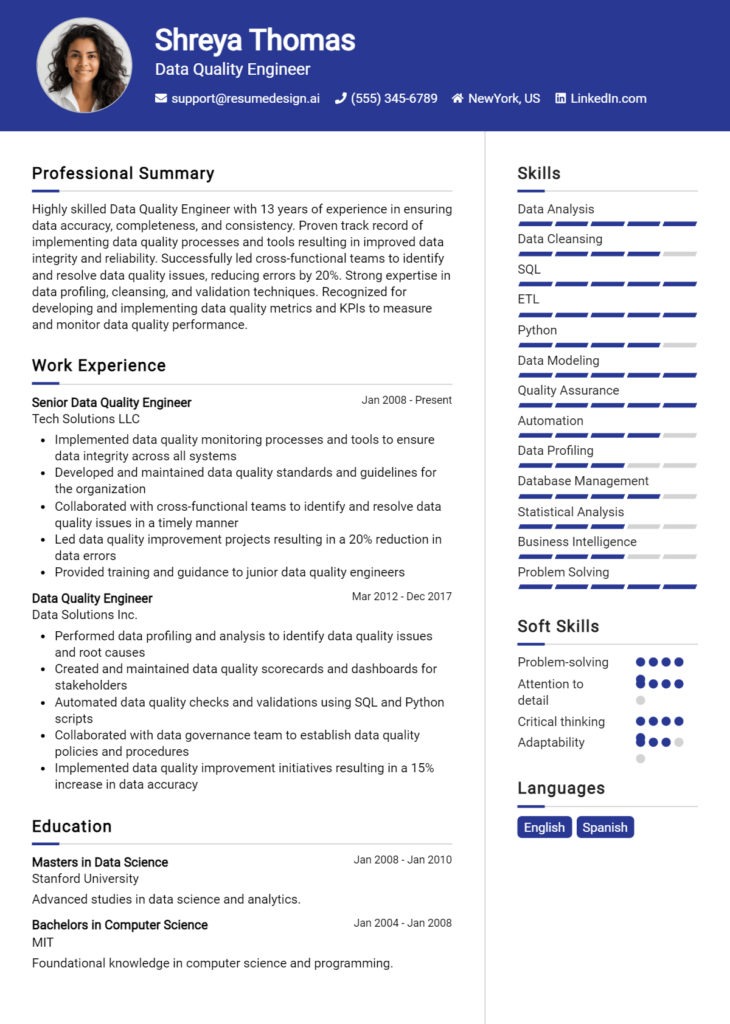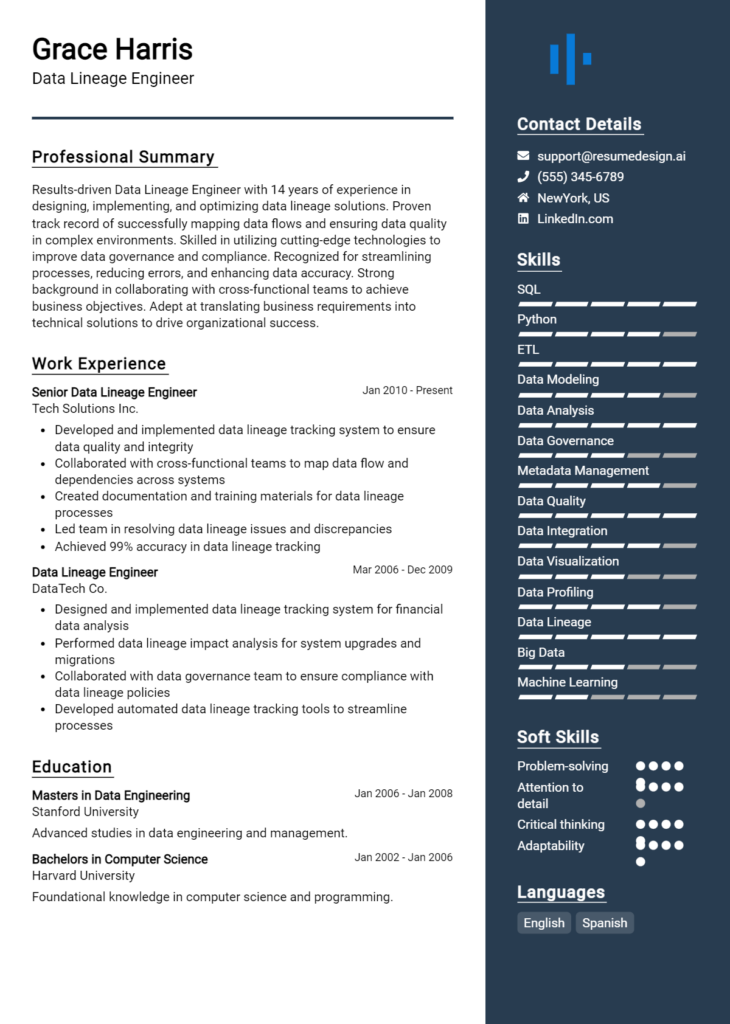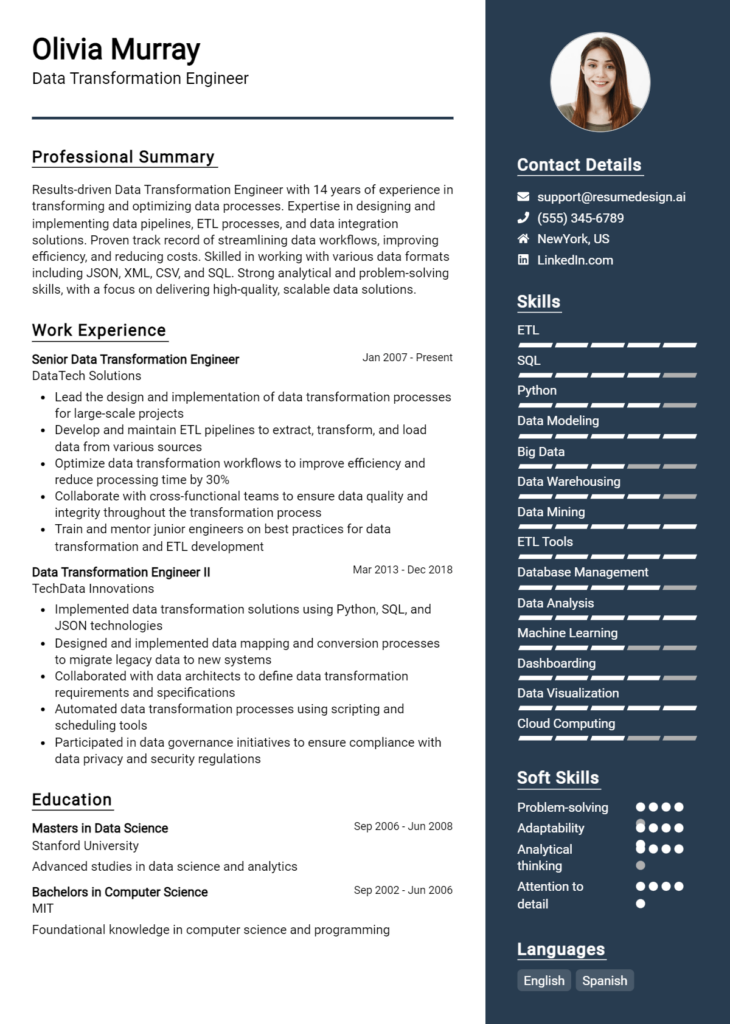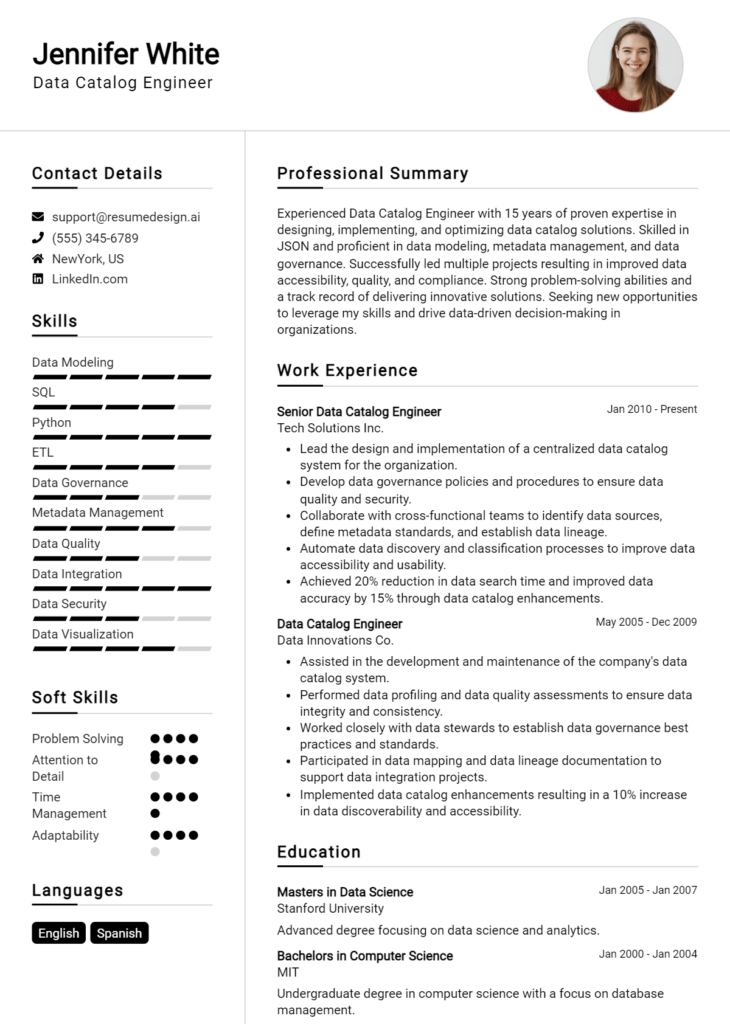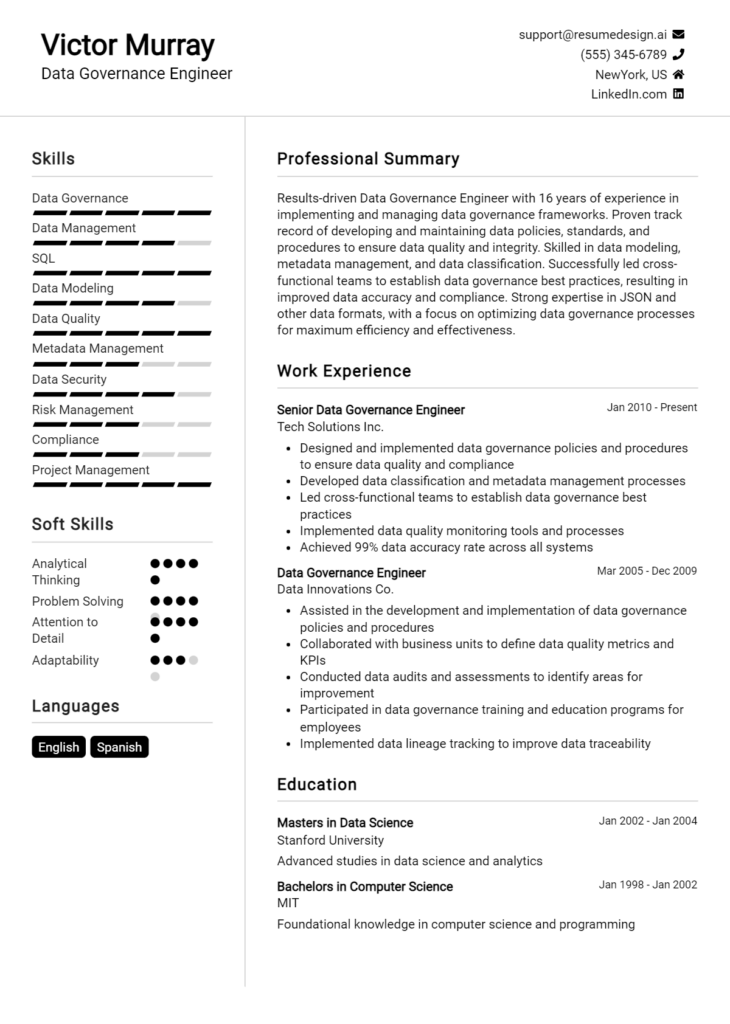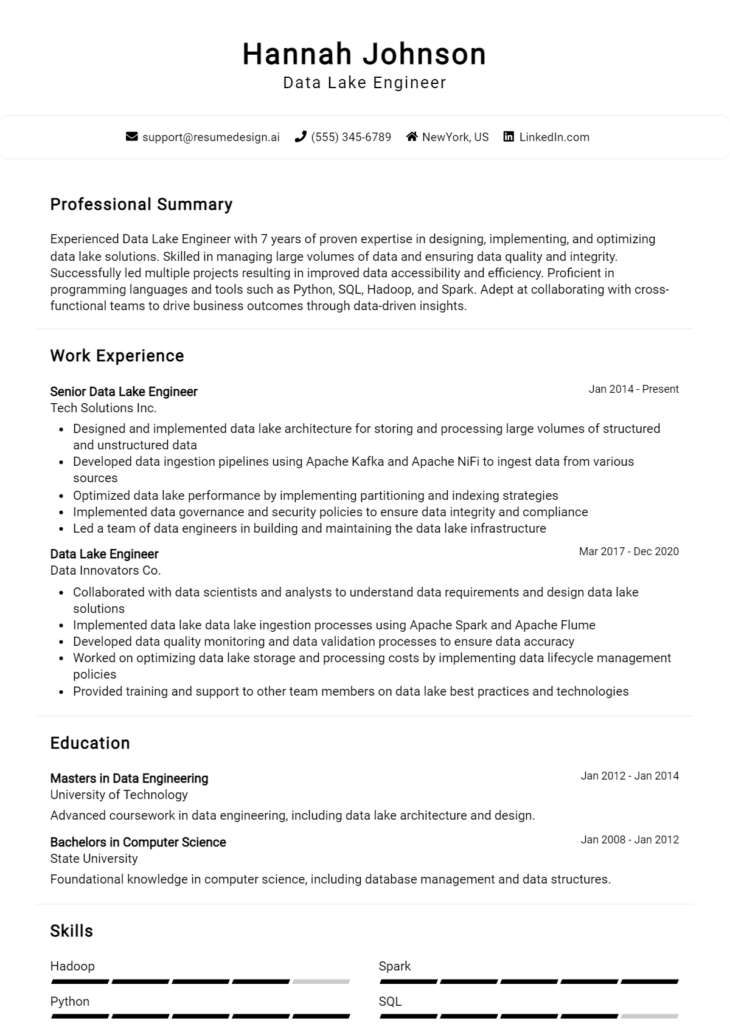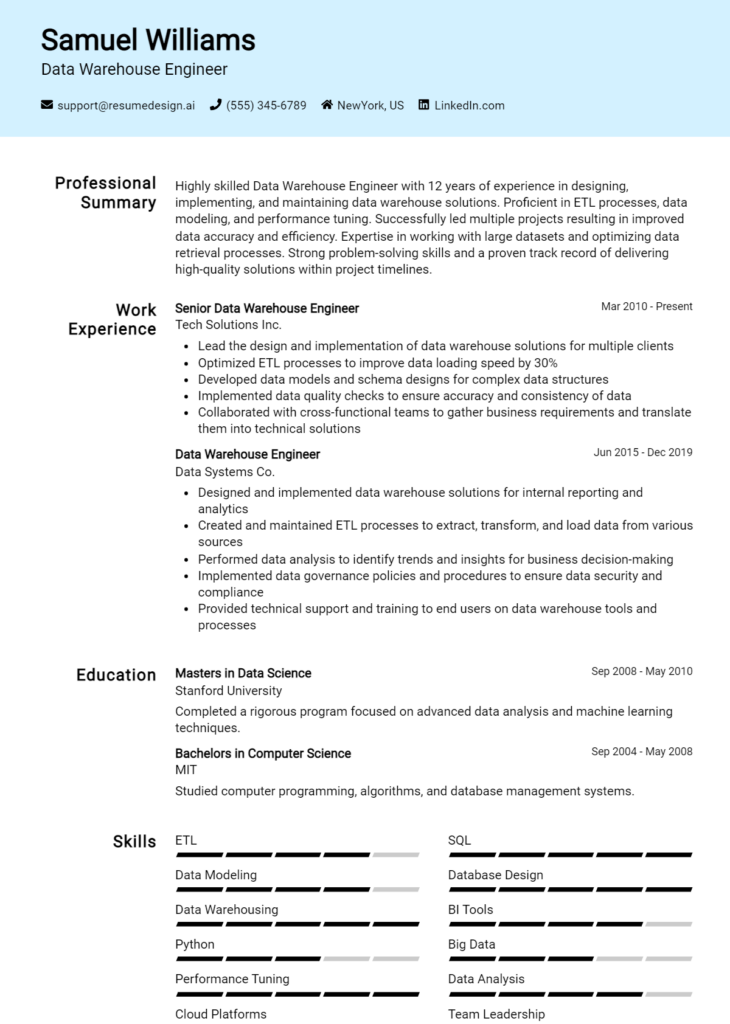Data Pipeline Engineer Core Responsibilities
A Data Pipeline Engineer plays a crucial role in bridging the gap between data engineering and analytics, ensuring seamless data flow across departments. Key responsibilities include designing, implementing, and maintaining efficient data pipelines while troubleshooting and optimizing performance. Successful professionals need strong technical skills in programming, data modeling, and database management, along with operational expertise and problem-solving abilities. These competencies help align data processes with organizational goals, making a well-structured resume essential to showcase these qualifications effectively.
Common Responsibilities Listed on Data Pipeline Engineer Resume
- Design and implement scalable data pipelines for real-time and batch processing.
- Optimize and monitor data workflows to ensure high performance and reliability.
- Collaborate with data scientists and analysts to understand data requirements.
- Perform data quality checks and troubleshoot pipeline issues.
- Integrate diverse data sources into unified systems.
- Document data pipeline processes and architectures for future reference.
- Stay updated on industry trends and emerging technologies in data engineering.
- Work with cross-functional teams to align data initiatives with business objectives.
- Implement data governance and security measures.
- Conduct performance tuning and optimization of existing pipelines.
- Utilize cloud platforms to enhance data processing capabilities.
- Train team members on data pipeline best practices and tools.
High-Level Resume Tips for Data Pipeline Engineer Professionals
In today's competitive job market, a well-crafted resume is essential for Data Pipeline Engineer professionals looking to make a strong impression on potential employers. Your resume is often the first opportunity to showcase your skills and achievements, serving as a key tool to differentiate you from other candidates. It's not just a list of responsibilities; it should reflect your unique qualifications and demonstrate how you can add value to an organization. This guide will provide practical and actionable resume tips specifically tailored for Data Pipeline Engineer professionals, ensuring that your resume stands out in a sea of applications.
Top Resume Tips for Data Pipeline Engineer Professionals
- Tailor your resume to each job description by incorporating relevant keywords and phrases that match the requirements.
- Highlight your technical skills, such as proficiency in programming languages (Python, Java, SQL) and data technologies (Apache Kafka, Hadoop).
- Showcase relevant experience by detailing specific projects you've worked on, including your role and the technologies used.
- Quantify your achievements with metrics, such as the amount of data processed, performance improvements, or efficiency gains you achieved.
- Include certifications relevant to data engineering, such as AWS Certified Data Analytics or Google Cloud Professional Data Engineer.
- Demonstrate your understanding of data architecture and design principles, emphasizing your ability to build scalable data pipelines.
- Highlight collaboration with cross-functional teams, illustrating your ability to communicate effectively with data scientists, analysts, and software engineers.
- Keep your resume concise and focused, ideally one page, ensuring that the most important information stands out.
- Use action verbs to describe your responsibilities and achievements, creating a dynamic and engaging narrative of your career.
- Proofread your resume carefully to eliminate any errors, as attention to detail is crucial in data engineering roles.
By implementing these tips, you can significantly increase your chances of landing a job in the Data Pipeline Engineer field. A polished and tailored resume not only highlights your qualifications but also conveys your professionalism and readiness to take on the challenges of the role, making you a compelling candidate for potential employers.
Why Resume Headlines & Titles are Important for Data Pipeline Engineer
In the competitive field of data engineering, a well-crafted resume headline or title serves as an essential tool for Data Pipeline Engineers. It acts as a powerful first impression, immediately grabbing the attention of hiring managers and summarizing a candidate's key qualifications in a concise yet impactful manner. A strong headline not only highlights the applicant's relevant skills and experience but also aligns closely with the job description, making it easier for recruiters to identify the right fit for their needs. Therefore, ensuring that the resume headline is succinct, relevant, and tailored to the specific role is crucial for standing out in a sea of applicants.
Best Practices for Crafting Resume Headlines for Data Pipeline Engineer
- Be concise: Aim for a headline that is short and to the point, ideally no more than 10-12 words.
- Use role-specific keywords: Incorporate industry jargon and specific skills relevant to data pipeline engineering.
- Highlight key accomplishments: If applicable, note any particular achievements that demonstrate your expertise.
- Tailor to the job description: Customize your headline for each application to reflect the specific requirements of the role.
- Focus on value proposition: Clearly convey what you bring to the table as a Data Pipeline Engineer.
- Avoid generic terms: Steer clear of vague phrases that don’t provide any meaningful insight into your qualifications.
- Include relevant certifications: If you hold any certifications that pertain to data engineering, mention them in your headline.
- Keep it professional: Ensure the tone is suitable for the industry and reflects your expertise.
Example Resume Headlines for Data Pipeline Engineer
Strong Resume Headlines
"Data Pipeline Engineer Specializing in Real-Time Data Processing and ETL Solutions"
“Results-Driven Data Pipeline Engineer with 5+ Years in Cloud-Based Data Architecture”
“Skilled Data Pipeline Engineer with Expertise in Python and Apache Spark”
Weak Resume Headlines
“Engineer Looking for Opportunities”
“Data Professional with Experience”
The strong headlines are effective because they are specific, showcasing the candidate's skills and experience in a way that directly correlates with the requirements of the job. They offer a glimpse of what the applicant can deliver, drawing the reader in for more details. In contrast, the weak headlines fail to impress because they lack specificity and clarity; they do not convey any meaningful information about the candidate's qualifications or what sets them apart, making it harder for hiring managers to see their potential value to the team.
Writing an Exceptional Data Pipeline Engineer Resume Summary
A well-crafted resume summary is essential for a Data Pipeline Engineer, as it serves as the first impression a hiring manager will have of a candidate. In a competitive job market, a strong summary quickly captures attention by highlighting key skills, relevant experience, and notable accomplishments. By succinctly presenting qualifications tailored to the specific job application, the summary can set the tone for the rest of the resume and significantly increase the chances of landing an interview. A concise and impactful summary not only demonstrates the candidate's value but also showcases their ability to effectively communicate complex information, which is vital in data engineering roles.
Best Practices for Writing a Data Pipeline Engineer Resume Summary
- Quantify Achievements: Use specific numbers and metrics to demonstrate the impact of your work.
- Focus on Relevant Skills: Highlight the technical and soft skills that are most pertinent to the job description.
- Tailor the Summary: Customize your summary for each job application, reflecting the language and requirements of the role.
- Be Concise: Aim for 2-4 sentences that capture the essence of your experience and qualifications without unnecessary detail.
- Use Action Verbs: Start sentences with strong action verbs to convey a sense of proactivity and accomplishment.
- Showcase Problem-Solving Skills: Highlight specific challenges you've overcome in previous roles and the solutions you implemented.
- Emphasize Continuous Learning: Mention any recent training or certifications relevant to data engineering and pipeline development.
- Maintain Professional Tone: Ensure language is formal yet engaging to reflect professionalism and expertise in the field.
Example Data Pipeline Engineer Resume Summaries
Strong Resume Summaries
Results-driven Data Pipeline Engineer with over 5 years of experience designing and implementing scalable ETL processes, achieving a 40% reduction in data processing time. Proficient in Python, SQL, and Apache Kafka, with a proven track record of optimizing data flows and enhancing data quality for large-scale analytics.
Detail-oriented Data Pipeline Engineer skilled in building robust data architectures and automating data ingestion processes, leading to a 30% increase in data availability across departments. Experienced in cloud platforms like AWS and GCP, with strong knowledge of data warehousing solutions.
Innovative Data Pipeline Engineer with expertise in developing real-time data solutions, successfully decreasing data latency by 25%. Adept at collaborating with cross-functional teams to define data requirements and leverage technologies such as Spark and Docker for efficient data management.
Weak Resume Summaries
Experienced engineer looking for a data-related position. I have worked with various technologies and have some knowledge of data pipelines.
Data Pipeline Engineer with skills in data processing and a general understanding of programming. Seeking opportunities to contribute to a team.
The strong resume summaries are considered effective because they include specific accomplishments, quantify results, and demonstrate relevant skills tailored to the Data Pipeline Engineer role. They provide clear evidence of the candidate's capabilities and how they have positively impacted their previous employers. In contrast, the weak resume summaries lack detail and specificity; they fail to highlight any quantifiable achievements or relevant skills, making them generic and less appealing to hiring managers.
Work Experience Section for Data Pipeline Engineer Resume
The work experience section of a Data Pipeline Engineer resume plays a critical role in demonstrating a candidate's technical skills, leadership capabilities, and commitment to delivering high-quality products. This section allows candidates to showcase their hands-on experience with data architecture, ETL processes, and cloud technologies, all of which are essential in today's data-driven landscape. By quantifying achievements—such as improved data processing speeds or successful project completions—and aligning their experiences with industry standards, candidates can effectively differentiate themselves in a competitive job market.
Best Practices for Data Pipeline Engineer Work Experience
- Highlight relevant technical skills such as data warehousing, ETL tools, and programming languages.
- Quantify achievements with specific metrics, such as percentage improvements or time savings.
- Use action verbs to begin bullet points, showcasing a proactive approach to problem-solving.
- Emphasize collaboration by detailing experiences working in cross-functional teams or leading projects.
- Align experiences with industry standards and best practices to demonstrate knowledge of current trends.
- Tailor the work experience section for each application, focusing on the most relevant experiences.
- Include any leadership roles or responsibilities that demonstrate your ability to manage teams and projects.
- Showcase any certifications or training that complement your work experience and technical skills.
Example Work Experiences for Data Pipeline Engineer
Strong Experiences
- Led a team of 5 in the migration of a legacy data warehouse to a cloud-based solution, resulting in a 30% reduction in data retrieval times and a 25% cost saving on infrastructure.
- Designed and implemented an ETL pipeline that processed over 1TB of data daily, achieving a 40% increase in data accuracy and significantly enhancing reporting capabilities.
- Collaborated with data scientists and analysts to develop a data model that improved predictive analytics, leading to a 15% increase in customer retention rates.
Weak Experiences
- Worked on various data projects that involved data processing and pipeline maintenance.
- Assisted with some tasks related to data management and team coordination.
- Participated in discussions about data strategies without specific contributions or outcomes.
The examples categorized as strong exhibit clear, quantifiable outcomes and demonstrate effective leadership and collaboration in technical environments. They provide specific metrics and accomplishments that showcase the candidate's capability to drive significant improvements in data processing. Conversely, the weak experiences lack specificity and fail to articulate the candidate's contributions or impact, making them less compelling to potential employers.
Education and Certifications Section for Data Pipeline Engineer Resume
The education and certifications section of a Data Pipeline Engineer resume is crucial as it serves to underscore the candidate's academic foundation and commitment to professional growth. This section not only highlights relevant degrees and specialized training but also showcases industry-recognized certifications that validate the candidate's expertise in data engineering. In a field where technology and best practices are constantly evolving, demonstrating a dedication to continuous learning through coursework and certifications can significantly enhance a candidate's credibility and alignment with the job role, making them a more attractive prospect for potential employers.
Best Practices for Data Pipeline Engineer Education and Certifications
- Prioritize relevant degrees in computer science, data engineering, or related fields.
- Include industry-recognized certifications such as Google Professional Data Engineer or AWS Certified Data Analytics.
- List specific coursework that pertains to data processing, ETL (Extract, Transform, Load), and data warehousing.
- Highlight any specialized training or boot camps that focus on data pipeline technologies and tools.
- Keep descriptions concise but informative, focusing on skills gained and applicable knowledge.
- Regularly update this section to reflect new certifications or degrees acquired.
- Use a clear format that distinguishes between degrees and certifications for easy readability.
- Consider including any relevant projects or research work that illustrates practical application of skills learned.
Example Education and Certifications for Data Pipeline Engineer
Strong Examples
- Bachelor of Science in Computer Science, University of XYZ, 2020
- AWS Certified Data Analytics – Specialty, 2022
- Google Professional Data Engineer Certification, 2023
- Coursework: Advanced Data Structures and Algorithms, Data Warehousing, ETL Processes
Weak Examples
- Bachelor of Arts in English Literature, University of ABC, 2015
- Certified Microsoft Office Specialist, 2018
- Coursework: Introduction to Philosophy, Basic Statistics
- Old Java Programming Certification, 2010
The strong examples are considered effective because they directly align with the skills and knowledge required for a Data Pipeline Engineer role, showcasing relevant degrees and up-to-date certifications that reflect industry standards. In contrast, the weak examples fail to demonstrate relevance to the position; outdated certifications and unrelated degrees do not provide value in the context of data engineering, highlighting the importance of selecting qualifications that resonate with the job requirements.
Top Skills & Keywords for Data Pipeline Engineer Resume
The role of a Data Pipeline Engineer is critical in today’s data-driven world, where the ability to efficiently collect, process, and analyze data can significantly influence an organization's success. Crafting a resume that highlights the right skills is essential for standing out in a competitive job market. Employers seek candidates who not only possess technical expertise but also demonstrate strong interpersonal abilities. A well-structured resume that showcases a blend of skills can showcase your capability to manage data workflows and collaborate with cross-functional teams effectively.
Top Hard & Soft Skills for Data Pipeline Engineer
Hard Skills
- Proficiency in SQL and NoSQL databases
- Experience with ETL (Extract, Transform, Load) processes
- Knowledge of data warehousing solutions
- Familiarity with cloud platforms (AWS, Azure, Google Cloud)
- Proficient in programming languages (Python, Java, Scala)
- Understanding of data modeling and database design
- Experience with data orchestration tools (Apache Airflow, Luigi)
- Familiarity with big data technologies (Hadoop, Spark)
- Knowledge of data visualization tools (Tableau, Power BI)
- Experience with version control systems (Git)
- Familiarity with containerization technologies (Docker, Kubernetes)
- Understanding of API integration and data ingestion
- Experience with data quality and validation techniques
- Knowledge of data governance and compliance standards
Soft Skills
- Strong analytical and problem-solving skills
- Excellent communication and collaboration abilities
- Adaptability and willingness to learn new technologies
- Detail-oriented with a focus on accuracy
- Strong organizational and time management skills
- Ability to work independently and in a team environment
- Critical thinking and decision-making skills
- Creativity in designing efficient data solutions
- Strong project management skills
- Ability to handle multiple tasks and prioritize effectively
- Strong interpersonal skills for stakeholder engagement
- Proactive attitude towards identifying and resolving issues
- Empathy and understanding of user needs
- Capability to mentor and guide junior team members
- Strong customer service orientation
By emphasizing both hard and soft skills, you can create a resume that effectively communicates your qualifications for the Data Pipeline Engineer role, ensuring that your work experience aligns with the expectations of potential employers.
Stand Out with a Winning Data Pipeline Engineer Cover Letter
Dear [Hiring Manager's Name],
I am excited to apply for the Data Pipeline Engineer position at [Company Name] as advertised on [Where You Found the Job Posting]. With a robust background in data engineering and a passion for building efficient and scalable data pipelines, I am confident in my ability to contribute effectively to your team. My experience in designing, implementing, and maintaining data processing frameworks aligns well with the requirements outlined in the job description.
In my previous role at [Previous Company Name], I successfully led the development of a data pipeline that processed over [X] terabytes of data daily, significantly improving data accessibility and analytics speed for our stakeholders. I utilized a range of tools and technologies, including Apache Kafka, Apache Airflow, and AWS, to ensure seamless data integration and transformation. My efforts resulted in a [X]% reduction in data processing time, allowing the analytics team to generate insights more rapidly and drive informed business decisions.
I thrive in collaborative environments and am adept at working with cross-functional teams to understand their data needs and translate them into actionable solutions. My proactive approach to problem-solving and continuous improvement has enabled me to identify bottlenecks in existing processes and implement optimizations that enhance overall system performance. I am particularly drawn to [Company Name] due to its commitment to innovation and excellence in data management, and I am eager to bring my skills in ETL processes, data warehousing, and cloud technologies to your esteemed organization.
Thank you for considering my application. I look forward to the opportunity to discuss how my expertise in data pipeline engineering can contribute to the success of [Company Name]. I am enthusiastic about the possibility of joining your team and am ready to bring my experience and dedication to help drive your data initiatives forward.
Sincerely,
[Your Name]
[Your LinkedIn Profile]
[Your Phone Number]
[Your Email Address]
Common Mistakes to Avoid in a Data Pipeline Engineer Resume
Crafting a compelling resume as a Data Pipeline Engineer is crucial in standing out in a competitive job market. However, many candidates fall into common pitfalls that can undermine their chances of landing an interview. Understanding these mistakes can help you create a more effective resume that showcases your skills and experiences. Here are some frequent errors to avoid:
Lack of Specificity: Using vague terms like "improved data processing" without quantifiable results can diminish your impact. Instead, specify how much you improved processing speed or reduced errors.
Ignoring Keywords: Failing to include industry-specific keywords can cause your resume to be overlooked by applicant tracking systems (ATS). Tailor your resume to align with the job description, incorporating relevant terminology.
Overloading with Technical Jargon: While it’s important to demonstrate technical expertise, excessive jargon can alienate non-technical hiring managers. Aim for a balance that communicates your skills clearly and concisely.
Neglecting Soft Skills: Focusing solely on technical abilities can make your resume one-dimensional. Highlighting soft skills like teamwork, problem-solving, and communication is essential for collaboration in data projects.
Inconsistent Formatting: A cluttered or inconsistent format can make your resume hard to read. Stick to a clean, professional layout with uniform font sizes and spacing to enhance readability.
Omitting Relevant Projects: Failing to mention key projects that demonstrate your capabilities can leave gaps in your experience. Include specific projects that showcase your role and the technologies used, emphasizing your contributions.
Neglecting Continuous Learning: In a rapidly evolving field like data engineering, not showcasing ongoing education or new certifications can make you seem outdated. Highlight relevant courses, workshops, or certifications to show your commitment to professional growth.
Skipping Achievements: Listing job duties without emphasizing your achievements doesn’t convey your true value. Focus on what you accomplished in each role, using metrics and outcomes to illustrate your impact.
Conclusion
As a Data Pipeline Engineer, you play a crucial role in managing and optimizing the flow of data within an organization. Your responsibilities include designing, building, and maintaining data pipelines, ensuring data integrity, and enhancing data accessibility for stakeholders. Key skills for this role encompass proficiency in programming languages like Python or Java, experience with ETL (Extract, Transform, Load) processes, and familiarity with cloud services and data warehousing solutions.
Moreover, it's essential to stay updated with the latest technologies and best practices in data engineering, as the field is continuously evolving. Understanding big data frameworks, such as Apache Hadoop or Spark, and possessing knowledge of database management systems will further strengthen your expertise.
In conclusion, whether you're seeking a new opportunity or advancing in your current role, it’s vital to have a polished resume that effectively showcases your skills and experience as a Data Pipeline Engineer. Take the time to review and enhance your resume to ensure it stands out to potential employers.
To aid you in this process, consider leveraging online resources such as resume templates, which can provide a professional layout. You might also explore the resume builder for a user-friendly way to create your resume. For inspiration, check out resume examples that highlight successful formats and styles. Lastly, don’t forget the importance of a compelling introduction; utilize cover letter templates to craft a strong cover letter that complements your resume.
Start refining your resume today and position yourself for success in your career as a Data Pipeline Engineer!

